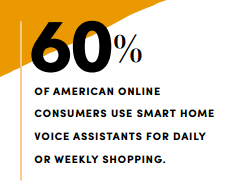Voice commerce offers convenience and enhanced personalization.
Using voice commands and AI-driven voice assistants to order products, including everyday necessities, continues to become a normal customer experience. Dubbed “voice commerce,” this allows consumers to interact with retail websites, bypassing screens and keyboards for a seamless shopping experience.

While voice commerce currently represents a fraction of overall ecommerce volume, its growth trajectory is undeniable. Currently, the experience is used more for searching, but ordering and even reoccurring orders are on the rise. It’s certainly a rising trend direct selling companies should explore or integrate onto a larger ecommerce strategy.
Voicebot.ai says 26 percent of voice assistant users have made a purchase using voice search, while Narvar says 43 percent of consumers use voice search to research products. According to DestinationCRM, approximately 60 percent of American online consumers use smart home voice assistants for daily or weekly shopping.
Understanding the Process
To grasp how voice commerce operates, envision yourself using an Amazon smart speaker and Alexa to order a blue suitcase with pivot wheels small enough to take on a plane. Through a simple dialogue with Alexa, you can specify the brand, capacity and color of the product in a conversational-style experience.
Voice commerce offers streamlined transactions, enhanced customer satisfaction, personalized recommendations and upsell opportunities.
However, it also presents challenges such as technology adoption barriers, trust issues, limited network integration and vendor instability. Integration can feature conversational keywords, optimized product content and incentivized repeat orders. As voice commerce continues to gain momentum, its impact on the retail industry is poised to grow exponentially. US voice commerce was projected to reach $80 billion by 2023.
Four Key Benefits in Voice Commerce
1/ Increased Brand Awareness
Voice commerce—with its ability to identify consumer patterns through voice search—ensures a seamless and enjoyable shopping experience, connecting customers to brands they trust.
2/ Personalized Buying Experience
With 71 percent of consumers desiring customization, voice commerce provides online shoppers a unique and tailored experience, leveraging valuable information about individual purchase habits to enhance efficiency.
3/ Enhanced Customer Experience
Utilizing digital payment systems and encrypted processors, voice commerce offers financial data protection, instilling confidence in customers to make secure purchases from unfamiliar online stores, while also simplifying product exploration and evaluation.
4/ Increased Convenience
By eliminating the need for website or app navigation, voice commerce provides a convenient and enjoyable shopping experience, catering to on-the-go schedules and streamlining the order placement process.
From the April 2024 issue of Direct Selling News magazine.


